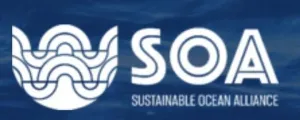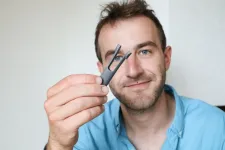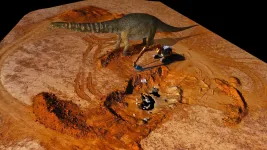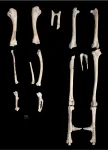A carbon neutral economy, preserving biodiversity, achieving sustainable seafood production, and reforming ocean governance are the four fundamental pillars supporting policy recommendations debuted in the Global Blue New Deal, an ocean policy framework built around crowd-sourced youth priorities.
"Healthy oceans are essential to human survival and well-being, and environmental health must be a global priority as we recover from the pandemic and build a sustainable blue economy," says Mark Haver, Chair of the Sustainable Ocean Alliance's Youth Policy Advisory Council.
He and 14 fellow Young Ocean Leaders on the Council spent a year gathering and synthesizing more than 100 survey responses in five languages from the SOA global youth community in 38 countries on how to end the cycle of ocean decline.
"Today's oceans are overfished, rife with plastic, and overexploited for minerals, fossil fuels and other non-renewable resources. We need to end this cycle of decline and generational injustice that threatens us all."
Today, June 7, 2021, is the first step of integrating public comment into the Global Blue New Deal. Our event, "Defining The Blue New Deal: A Youth Led Workshop For The Future of Our Ocean," seeks to collect feedback on our framework from youth and stakeholders ahead of larger public comment periods.
Starting in July, our public comment period seeks to engage the UN Major Group for Youth and Children, UN Ocean Decade affiliates, the NGO sector, more youth, and other ocean stakeholders in gathering input ahead of our official launch of the final Global Blue New Deal before COP26.
The Global Blue New Deal consists of four pillars. Each pillar has sub-pillars with specific ocean policy solutions.
In brief:
Pillar 1 Carbon Neutrality: Transition to a Zero Carbon Future
Limiting carbon emissions is of utmost importance to preserve ocean health due to its impact on ocean acidification levels, marine biodiversity, sea level rise and livelihoods of coastal communities, especially in Small Island Developing States.
Subpillars:
End offshore drilling and invest in renewable ocean energy, in accordance with a recent International Energy Agency report stating there is "no need for investment in new fossil fuel supply in our net-zero pathway."
Decarbonize the shipping industry, which produces approximately 2.5% of global greenhouse gas emissions, and use revenues from economic tools such as carbon pricing to research and develop zero-carbon shipping.
Reduce land-based marine pollution which is responsible for about 80% of all marine pollution. Halt or curb manufacturing and use of plastic nurdles (small beads used in various products), plastic bags, and microplastics through use of bans, taxes, and other disincentives.
Transition to a circular economy to shift from today's linear take-make-waste model to a sustainable economic system where we reduce what we take and reuse and recycle what we already have.
Strengthen legislation and enforcement against ocean contamination to build accountability and affirm commitments to the London Protocol.
Pillar 2 Preserve Biodiversity: Apply Nature-based Solutions to Promote Healthy Ecosystems and Climate Resilience
Prioritize conservation of the planet's ecosystems, which remove carbon dioxide, methane and other greenhouse gases from our atmosphere while providing cleaner air and water, reducing coastal erosion, bolstering climate resilience and providing habitat.
Subpillars:
Support the global movement to protect 30% of the world's ocean by 2030 and establish Marine Protected Areas (MPAs) with a robust scientific foundation and "no-take zones" where extractive activities are prohibited.
Enforce against non-compliance in Marine Protected Areas (MPAs) to prevent "paper parks."
Establish a global moratorium against deep-sea mining -- an unjustified threat to unique deep-sea biodiversity.
Transition from "gray" manmade infrastructure, such as culverts and seawalls, to nature-based blue carbon infrastructure including the restoration of wetlands, mangroves, marshes, oyster reefs, coral reefs, kelp forests, and the installation of living shorelines to sequester carbon and promote biodiversity.
Pillar 3: Sustainable Seafood: Match Increasing Global Demand Sustainably
With one-third of global fish stocks overfished and climate change exacerbating the pressures placed on already vulnerable fish populations, feeding future generations depends on the viability of ocean ecosystems.
Subpillars:
Encourage sustainable governance of capture fisheries to sustainably manage the fish stocks within and outside countries' Exclusive Economic Zones, and adopt precautionary and ecosystems-based approaches to fisheries management.
Enforce against Illegal, Unreported, and Unregulated (IUU) fishing with clear supply chain inspection processes to certify the origin and legality of the fish landing in ports. Direct greater funding and technological support (including Vessel Monitoring Systems) to detect IUU fishing.
Eliminate capacity-enhancing fisheries subsidies, amounting today to tens of billions of dollars that promote overfishing, and redirect the funds to fisheries management and research, marine protected areas, and increased economic opportunity for coastal communities.
Provide a sustainable path for aquaculture, with low-impact production and feed supply to ensure that as we feed ourselves, we can also feed the generations of tomorrow.
Fund research and development of plant-based and cell-cultured seafood, to provide an alternative supply while assessing potential risks and benefits.
Pillar 4: Stakeholder Engagement: Include Local Communities in Natural Ocean Resource Management
Ocean governance should be built on sound legal and institutional mechanisms that are horizontally integrated to ensure full transparency in decision-making processes and building self-sufficient community management.
Subpillars:
Ensure the sustainability of coastal ecotourism, where current and future economic, social, and environmental impacts are taken into full account with full stakeholder participation. Create financial incentives to support the most sustainable ecotourism companies and incentivize others to become more and more sustainable.
Promote ocean research and innovation to scale ocean solutions and map 100% of the global seafloor by 2030.
Emphasize ocean literacy and capacity building to build the skills and networks for effective leadership, policy development, stakeholder engagement, and communication to conserve and protect oceans through community management.
Build stakeholder participation in ocean governance, embrace inclusion and diversity, and involve as many stakeholders as possible in management of marine and coastal ecosystems, particularly those who are directly affected.
Background
Young Ocean Leaders, all under 35 years of age, are part of SOA's global community of youth, entrepreneurs, and experts from 165 countries and territories -- the world's largest youth-led network of ocean allies working to solve the greatest challenges facing our oceans.
"Youth are the greatest stakeholders in the future health of the ocean environment," says Marina Porto of Brazil, Co-Chair of the Youth Policy Advisory Council. "They need to be directly involved in building a sustainable blue economy that ensures the health of the ocean ecosystem while providing economic opportunities."
The United Nations has recognized the increasingly degraded state of our ocean and declared 2021-2030 a Decade of Ocean Science for Sustainable Development, which officially launched June 1.
The UN has called on global ocean stakeholders to develop and support a common framework to deliver "the ocean we need for the future we want".
The ocean provides an estimated USD $3 to $6 trillion in ecosystem services, jobs, and cultural services. Fisheries and aquaculture alone contribute USD$100 billion per year and 250+ million jobs.
"We see this as our opportunity to rewrite the long history of an increasingly compromised ocean," concluded Mark Haver. "Each generation has inherited an increasingly degraded ocean environment with the poorest, most vulnerable communities feeling the impacts the most severely."
INFORMATION:
SOA's Youth Policy Advisory Council (YPAC) is comprised of 15 Young Ocean Leaders recognized for their policy acumen and dedication to furthering environmental regulation in their region.
North America / Caribbean
Mark Haver
YPAC Chair, USA
Mark is an ocean policy and communications advisor based in Washington, DC. He's been active at the intersection of youth organizing, ocean climate policy, and politics. Mark has been involved with SOA for four years and has been driving the development of the Blue New Deal to rally global youth around an intergenerational call for a healthy ocean and just future.
Nicolas P Florestal
Haiti
Nicolas has successfully worked on establishing Haiti's first official network of Marine Protected Areas and has worked in them as an ecodiver since 2011.
Latin and South America
Marina Porto
YPAC Co-Chair, Brazil
Marina has engaged in several projects related to sustainable production and consumption, climate change and marine litter. She holds a masters degree in Environmental and Natural Resource Economics and is a sustainability consultant at Sofies UK.
Diwigdi Valiente
Panama
Diwi is a member of the indigenous Guna people of Central America, whose islands may disappear under the rising sea within his lifetime. He develops and leads initiatives to raise awareness and inspire political action against climate change and plastic pollution in Panama.
Europe
Leonie Meier
YPAC Secretary, Germany
Leonie is passionate about the ocean, having researched microplastic pollution for her Master's thesis. She has worked on a wide range of environmental and sustainability issues for various UN organizations and the public sector in Germany.
Lucie Guirkinger
Belgium
Half-French, half-Colombian, Lucie is a passionate marine conservationist who recently graduated from the University of Cambridge where she investigated fishers' non-compliance and how this can be addressed. She has also managed several projects on corals, sharks, rays and turtles.
Africa
Pauline Owiti
Kenya
Pauline has been serving as a Project Lead in initiatives that aim to declare the Arctic Ocean as a Marine Protected Area. She currently serves as the National Coordinator of Kenya at the United Nations Conference of Youth, the Kenya Coordinator at Extinction Rebellion, and part of Kenya Youth Biodiversity Network.
Emerson Neves
Mozambique
Emerson works for the Marine Megafauna Foundation in Mozambique. He has been recognized as a 2021 Top 100 Young African Conservation Leader, a 2021 Climate Ambassador with the Global Youth Climate Network through the World Bank, and a 2020 Disney Conservation Hero.
Oceania and Small-Island Developing States
Jeremy Raguain
Seychelles
Life in Seychelles depends on the ocean. Jeremy works with the Seychelles Islands Foundation, a non-profit organisation which manages Seychelles' UNESCO World Heritage Sites. In this role, and through his volunteering with Global Shapers and SOA, Jeremy contributes his efforts towards SDGs 13, 14 and 17 through evidence based management with environmental justice in mind.
Alanna Smith
Cook Islands
Alanna, who works for the environmental NGO 'Te Ipukarea Society,' has actively opposed Cook Islands seabed mining, worked on Marine Spatial Planning projects and biodiversity surveys, and helped raise public awareness of plastic pollution.
Asia
Surangika Jayarathne
Sri Lanka
Surangika works as a researcher in the areas of sustainable blue economy, climate change and maritime security in South Asia.
Lu Fang
China
Lu Fang leads the seafood sustainability assessment effort of an NGO, the Qingdao Marine Conservation Society. She also provides scientific and analytical support to several sustainable fisheries and aquaculture projects.
Roger Joseph (Rocky) Guzman
Philippines
Rocky is a lawyer and ocean policy specialist involved with environmental non-profits, where he handled policy campaigns related to fisheries management and ending illegal fishing, marine conservation and strengthening the rule of law.
Fidan Karimova
Azerbaijan
Fidan works to bridge the gap between water and wastewater utility needs and available technologies. She has helped entrepreneurs worldwide to bring ideas to market. A University of Maryland graduate with a Bachelor's degree in business and a Master's in environmental management, Fidan is an avid ocean supporter and artist.
Andreas Aditya Salim
Indonesia
Andreas is a lawyer dedicated to eradicating illegal, unreported and unregulated fishing and improvement of ocean management in Indonesia. He served as a legal counsel for the Commander of the Republic of Indonesia's Presidential Task Force to Combat Illegal Fishing for four years prior to his participation in the United Nations Division for Ocean Affairs and the Law of the Sea. He obtained his law degree from the University of Indonesia and is enrolled in the Berkeley Law LL.M. program





